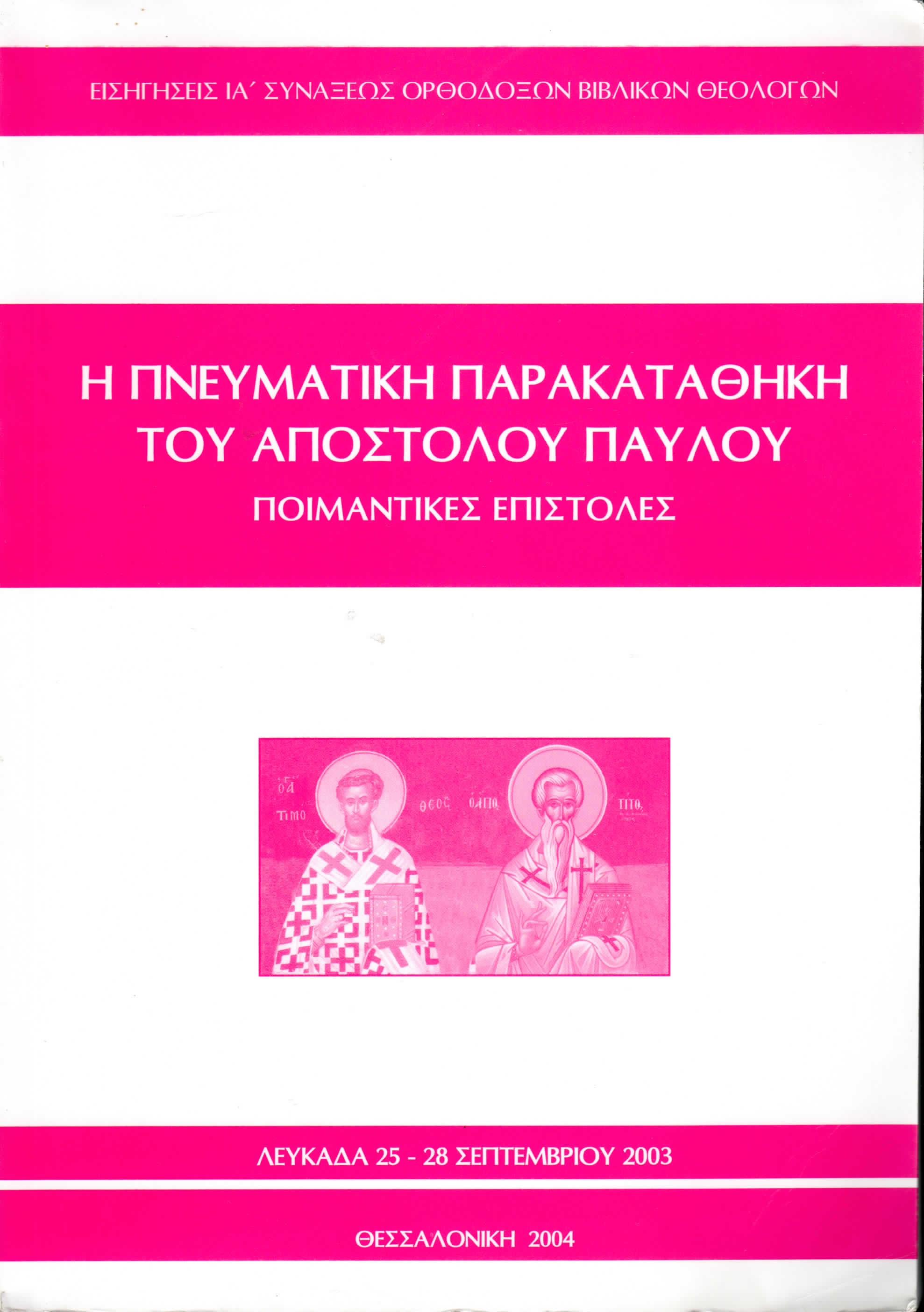614. Castiglioni, Luca. “Uguaglianza battesimale e differenze carismatiche: Il pensiero della differenza sessuale nella tradizione Paolina (II) [“Baptismal equality and charismatic differences: The thought of sexual difference in the Pauline tradition (II).”].” Scuola Cattolica 148.1 (2020): 7–35 [addresses 1 Tim 2:8–15 and appears to have relevance for whether husbands/wives are in view in the passage or men/women more generally].
662. Majtán, L’ubomír. “Timotej a charizma v 1Tim 4,14 Ratifikácia alebo transfer pri vkladaní rúk starších? [Timothy and Charisma in 1 Tim 4:14: A Recognition or a Transfer through the Laying on of Hands by the Elders?]” Studia Biblica Slovaca (Bratislava) 11.2 (2019): 103–19. [Slovak]
663. Barclay, John M. G. “Household Networks and Early Christian Economics: A Fresh Study of 1 Timothy 5:3–16.” New Testament Studies 66.2 (2020): 268–87.
697. Bechmann, Ulrike. “Essen eint, essen trennt.” Bibel und Kirche 75.1 (2020): 21–29. [includes discussion of a shift from cultically pure to morally unclean in the LTT, e.g., 1 Tim 4:1–5; Titus 1:15]
703. Hedrick, Charles. “Myth and Mystery: Profiling the Early Christian Mind.” The Fourth R 32.5 (2019): 7–10, 20. [includes engagement of “myth” and “mystery” in their usages in the LTT]
(p. 291) O’Donovan, Oliver. “Neither Sober nor of Sound Mind: Timothy’s Spirit of sōphronismos.” Pages 346–62 in One God, One People, One Future: Essays in Honor of N. T. Wright. Edited by John Anthony Dunne and Eric Lewellen. Minneapolis: Fortress, 2018.
(p. 295) Jacob, Sharon. “Imagined Nations, Real Women: Politics of Culture and Women’s Bodies: A Postcolonial, Feminist, and Indo-Western Interpretation of 1 Tim. 2:8–15.” Pages 407–16 in T&T Clark Handbook of Asian American Biblical Hermeneutics. Edited by Uriah Y. Kim and Seung Ai Yang. London: Bloomsbury T&T Clark, 2019.
(p. 312) Ehrensperger, Kathy. “Διδάσκαλος ἐθνῶν—Pauline Trajectories According to 1 Timothy.” Pages 88–104 in The Early Reception of Paul the Second Temple Jew: Text, Narrative and Reception History. Edited by Isaac W. Oliver and Gabriele Boccaccini with Joshua Scott. Library of Second Temple Studies 92. London: Bloomsbury T&T Clark, 2019. Repr., in Searching Paul: Conversations with the Jewish Apostle to the Nations; Collected Essays. Wissenschaftliche Untersuchungen zum Neuen Testament 429. Tübingen: Mohr Siebeck, 2019.
(p. 312) Ehrensperger, Kathy. “Striving for Office and the Exercise of Power in the ‘House of God’: Reading 1 Timothy 3:1‒16 in the Light of 1 Corinthians 4:1.” Pages 104‒23 in The Bible in Church, Academy and Culture: Essays in Honour of the Reverend Dr. John Tudno Williams. Edited by Alan P. F. Sell. Eugene, OR: Wipf & Stock, 2011.Repr., in Searching Paul: Conversations with the Jewish Apostle to the Nations; Collected Essays. Wissenschaftliche Untersuchungen zum Neuen Testament 429. Tübingen: Mohr Siebeck, 2019.
(p. 318) Thompson, James W. Apostle of Persuasion: Theology and Rhetoric in the Pauline Letters. Grand Rapids: Baker Academic, 2020. [discusses Pauline theology and rhetoric in the LTT]
(p. 321) Elengabeka, Elvis. “La rhétorique de la temporalité dans les épîtres pastorales.” Pages 377–95 in Perceptions du temps dans la Bible. Edited by M. Staszak and M. Leroy. Etudes Bibliques 77. Leuven: Peeters, 2018.


